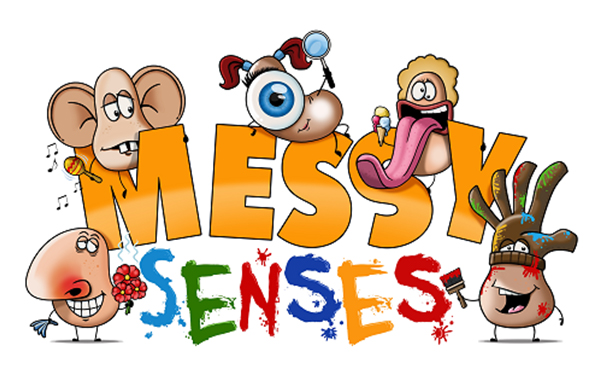Messy Play – A Case Study

Louise Coleman is business owner, director, creator and all round crazy sensory play lady of Messy Senses, established in 2016 and devoted to delivering inclusive, sensory, messy play sessions to a huge variety of children, young people and adults. Here she tells us how messy play can help develop communication.
Don’t children just love messy play? Think sand, water, mud pies and play doh, cold rice pudding, pasta and jelly! But did you know that all that fun had squigging cold baked beans and pulling cotton wool balls apart can actually maximise communication by facilitating the chance to speak and listen about how textures feel and even taste? Think of all the descriptive words such as slimy, gooey and icy that can be used to describe the sensations experienced during messy play.
Messy play uses all five main senses of the human body and helps to stimulate all aspects of brain development. By enhancing communication through sensory experiences, neural pathways within the brain are formed and learning is maximised. Messy play makes an enormous contribution to overall child development from birth right through to the elderly, especially those with SEND, Dementia and Alzheimer’s. By encouraging fun through sensory exploration, communication is naturally triggered both verbally and non-verbally.
An important part of our work at Messy Senses is visiting early years settings. Here we work, alongside practitioners, to maximise learning outcomes for individuals who may be struggling with many aspects of play-based education. The following case study demonstrates what can be achieved through carefully planned messy play sensory development sessions provided for a young child, on the autistic spectrum, who was struggling to remain engaged in activities for more than 3-4 minutes.
Henry* was non-verbal and unable to maintain eye contact for more than a few seconds. He was also tactile defensive and hated touch from anyone or anything.
Staff in his early years setting were finding it almost impossible to achieve individual outcomes for him to ensure that he was equipped with the skills needed to go to school. More importantly, they were also struggling to provide him with a play environment that he felt at ease with. This is where the professional support from Messy Senses came in.
Following a personal consultation, we implemented a structured, sensory, education and development plan through a bespoke block of 6 x 1 hour sessions weekly sessions. Five of his peers and two members of staff also attended the sessions.
How did the programme work?
A very rigid structure to the sessions was extremely important whilst maintaining the flexibility for each child to get involved and become as messy as they liked without restrictions. In each session, five messy play trays were set up, at floor level, for Henry; each tray contained a contrasting stimulus that was extremely appealing to the eye. All the activities were initially demonstrated to the group. We used used different communication styles (i.e. verbal and Makaton sign) to help ease Henry gently into the session.
Soon, parallel play with peers and staff began to happen, he maintained eye contact, made verbal communication sounds and even began to mimic my signing of “more” when he wanted us to pour some edible sand onto his toes. Staff and peers also picked up on these non-verbal communication cues and soon followed trend. The staff were amazed that all of this came from a totally structured but very relaxed messy play session, combined with positive reinforcement and clear communication of learning outcomes. This was the first time that he was able to communicate with the people around him and for them to also communicate back, which suddenly enabled staff to improve their observations and provide improved feedback to his parents. It is safe to say that, after the 6-week block of sessions, we had one very different little boy with a bright future in front of him.
Tips for successful messy play
- Encourage eye contact by bringing resources up eye level for the child to look at
- Push boundaries - pour resources onto their feet and into their hands
- Take part – (an important aspect of this process was showing Henry that I was doing it too and how it made me and others around me smile and laugh.)
- Give lots of praise using Makaton sign and using short, positive phrases
Just goes to show that messy play can really change someone’s life!
About Messy Senses
Alongside our day to day messy play sessions, we also offer many other professional support and developmental type services. These include bespoke private hire events, parent and tots’ groups, charity work, fundraising, training, consultancy, care home support for the elderly, parent support groups and one-to-one sessions for individuals with sensory impairment needs.
During Covid-19, it was impossible to work face-to-face with families to help make a difference. At this time, our 8-year-old daughter was taking part in a 10-mile charity bike ride to help raise funds used to supply vulnerable families. She did a fantastic job and raised a whopping £400, which allowed us to provide over 100 free sensory boxes to families across Leicestershire.
Following some fabulous feedback, we decided to launch our sensory boxes to the wider community and what a hit they have been! Our ‘at home’ kits have been so popular that we now launch a brand-new themed box each month. These can be purchased directly from our website at a cost of only £13 each!
CONTACT DETAILS For more information, please contact Louise at:
✓ Tel: 07725582071
✓ Email: louise@messy-senses.co.uk
✓ Website: www.messy-senses.co.uk
✓ Facebook: Messy Senses Ltd